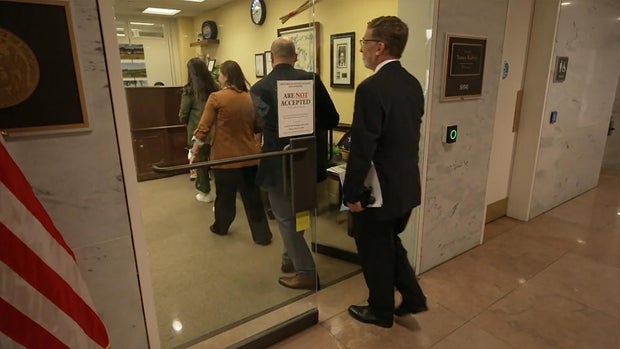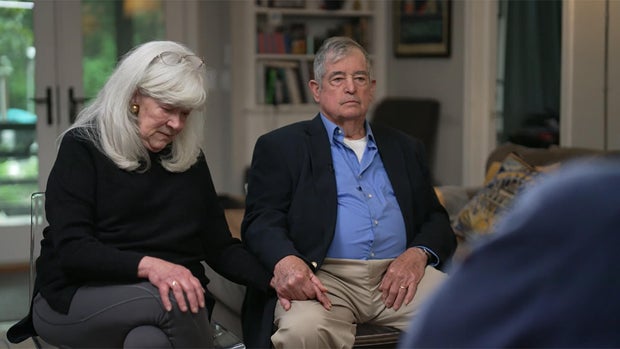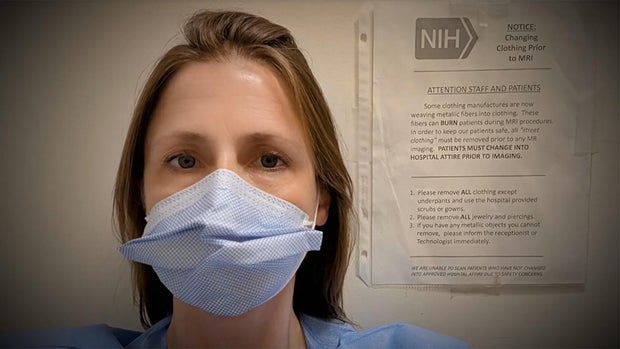Medical researchers, patients decry Trump admin's layoffs, budget cuts

They might easily be mistaken for Congressional staffers, reluctant to face the day, but these are among the most accomplished cancer specialists in the country, meeting with Representatives, Senators and staff. Among them: Dr. Elizabeth Jaffee, deputy director of the Johns Hopkins Kimmel Cancer Center, from up the road in Baltimore; and Dr. George Weiner, a cancer specialist in Iowa for more than 35 years, who has flown in frequently to lobby Congress for more research funds.
Lobbying for cancer research, he says, used to be like pushing on an open door. "Most of the time when I've come, I've met with Democrats and Republicans, and we talked about the bipartisan support for cancer research," Weiner said. "This is the first time that I felt there was an existential crisis in our ability to make the type of progress that I see in front of us."

These days, the conversation is all about thousands of layoffs … delays in research … massive budget cuts – close to a 40% proposed cut in funding for the National Cancer Institute.
"I wake up every morning looking at my phone: Did I get an email from the National Cancer Institute saying I'm no longer receiving my grants?" said Jaffee.
Has she felt the impact yet? "Oh, yeah, we certainly have felt the impact, to the point where people are leaving," Jaffee replied. "So, in our clinical research operation, which takes years to build, train research nurses, takes two years to train coordinators, takes six to 12 months, these people are leaving because the funding isn't coming in."
I asked, "If they keep cutting back, how long before Dr. Jaffee says, 'That's it'?"
"I have to be honest, there are days when I do feel that," she replied. "But I look around and I feel like I would be disloyal to our patients. We are in a technological revolution in cancer research. We are rapidly making discoveries that we couldn't even do ten years ago."
"What price do you put on life?"Kevin Callahan was a Marine in Vietnam when he barely survived stepping on a land mine. Decades later, he was diagnosed with a killer disease: pancreatic cancer. First came surgery and chemo. Now, he's part of a clinical trial, which is where Dr. Jaffee and her colleague Dr. Neeha Zaidi come in, working to develop a vaccine to prevent pancreatic cancer from recurring.
I asked Callahan, "When you see some of the debates that are going on right now, and it relates to the National Cancer Institute and NIH …"
"It raises the hair on the back of my neck," he replied.
Beth Callahan wasn't all that sure about the clinical trial at first, but Kevin couldn't stop thinking about all that had gone into it – getting chemotherapy as an approved treatment. "They would shoot me up with three drugs, and the fourth one I would go home with a little bag on my chest, and it wouldn't come out until Friday. It had to be done over 40 hours. I thought to myself, 'How many poor bastards went through tests to get that done?' So I thought, 'If there's anything that I can do, I'm more than happy to go in with the study and see if I can help somebody else later on, [to] develop this vaccine.'"

Pancreatic cancer is particularly nasty, even when, as with Kevin, it's detected early. The experimental vaccine they've been administering to him is promising, but according to Jaffee, the chances of recurrence are 80%, and the chances of a patient being alive in five years is 20%.
Yet, Kevin is four-and-a-half years out, without recurrence, "part of a small cohort of patients who received the vaccine on that trial who are, like him, doing well without recurrence," Jaffee said.
I asked, "Could it be anything other than the vaccine?
Jaffee replied, "We don't believe so. This is not a cancer where sometimes it looks less aggressive than other times. This is a cancer that uniformly – it doesn't matter who you are – it comes back."
And so far, it has not. Kevin says, "Bottom line, I'm cancer free."
Now the Callahans are concerned the cuts at the NIH could interfere with – or even stop – Kevin's vaccine trial.
I said, "They claim that they're not cutting back on any of the science, on any of the people who are really doing the research."
"I don't believe that for a minute," said Kevin.
Asked if it is worth the money invested by taxpayers, Beth responded: "What price do you put on life? It's our lives. It's our children's lives. It's our grandchildren's lives. What price do you put on that? We're not just talking about cutting funding to individual research programs. We're talking about NIH, which is a gift that we have had in this country for decades. Why would we give that up as a country?"
Located just outside of Washington, D.C., the National Cancer Institute is the crown jewel of the National Institutes of Health. It is also the most expensive. Its budget last year was $7 billion.
Dr. Weiner noted, "Mary Lasker, who was a brilliant woman and a force of nature who worked with Richard Nixon on the original war on cancer, would say, 'If you think research is expensive, try disease.'"
The Trump administration is proposing cutting that $7 billion cancer budget down to about $4.5 billion. Weiner thinks that America's widely-recognized position as the world's leader in medical research is at a tipping point. "Progress is gonna be proportional to investment," he said. "So, progress is not gonna totally stop if funding drops dramatically. But the more it drops and the longer it drops, the slower progress will be.
"But that's not the case for patients," he said. "Our job as researchers is to bring those advances to help those patients as soon as possible, because those patients can't wait."
That would describe Natalie Phelps' dilemma to a T.
"When is cancer political?Natalie Phelps has Stage 4 metastatic colorectal cancer. She and her husband, Jeff, live out in Washington State.
"We have one boy, one girl, and a giant German Shepherd, very average American," she said. "And I had always hoped, if I needed a clinical trial, I was like, 'I'm gonna get to the NIH. I'm gonna go to the top place in the world.'"
Phelps was invited to NIH for testing to determine if she qualified for a promising breakthrough immunotherapy treatment that has shrunk tumors in about a quarter of the patients with gastrointestinal cancers. She said, "When I was invited to go back, I had cancer patients congratulating me. They were like, 'You made it!' It's like making it into the Olympics when you're a cancer patient."

The clinical trial is run by Dr. Steven Rosenberg, a legend in the field of cancer research who is still practicing in his mid-eighties. "Well, she's a young woman with a metastatic cancer, and so that's a desperate situation. Every patient we see here at the National Cancer Institute has been through all standard treatments that haven't worked. And they come here to the NIH, the National Institutes of Health, of Hope, trying to see if some experimental treatments might be of help to them."
In late May, Natalie Phelps finally qualified for Rosenberg's clinical trial. But budget cuts at NIH had already slowed the trial down. NIH has lost about 1,500 employees.
"We did lose two technicians that are involved in producing the materials that are used to treat patients," Rosenberg said.
"And would that cause a significant delay?" I asked. "When I say 'significant,' I mean in Natalie's case she feels that it has been delayed by a month. Is that correct?"
"That's correct."
"A month could be critical for her."
"It certainly can when you have metastatic cancer that's growing," Rosenberg said.
That one-month delay means Natalie's specialized immune cell therapy won't be ready until late July. I said to her, "I don't even know what seems like an appropriate question. You must be devastated."
"Well, yeah, Ted," she replied. "I was diagnosed in 2020 during COVID, after giving birth to my second child. And I had to spend the first bit of my child's life changing diapers and doing bottles with the chemotherapy pump attached to me. I've done 48 rounds of chemotherapy. I've had multiple aggressive surgeries and radiation. And I have been in treatment for five years, hoping that I can raise her, but at the very least let her have a memory of who her mother was.
"I have endured so much, and now I have another hurdle just because of funding cuts?" she said. "I mean, my husband and I can't believe it. When is cancer political?"
In a recent online statement, NIH Director Jay Bhattacharya pushed back on concerns about budget cuts and employee layoffs. He said, "As to the current re-organization, no clinical trial has been delayed, nor has any participant been dropped from any clinical trial…"
Natalie Phelps is just one patient, one case out of many; but her participation in a clinical trial was delayed, because two specialized technicians were let go.
And that delay has proved to be devastating. She sent us a video message a couple of days ago from NIH:
"I got my test results back today and I didn't pass," she said. "I have several new brain tumors, and it's not safe for me to participate in the trial. The earliest I could get back here for treatment would be about six weeks after having the tumors radiated, provided that the radiation's successful. I don't know. It's a long time."
As for the budget cuts that caused the layoffs that produced the delay, it probably won't help much to learn that they were nothing personal.
For more info:
Story produced by Deirdre Cohen. Editor: Ed Givnish.
See also:
Cbs News




